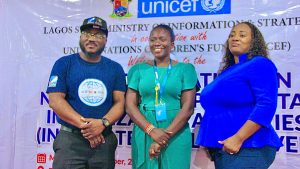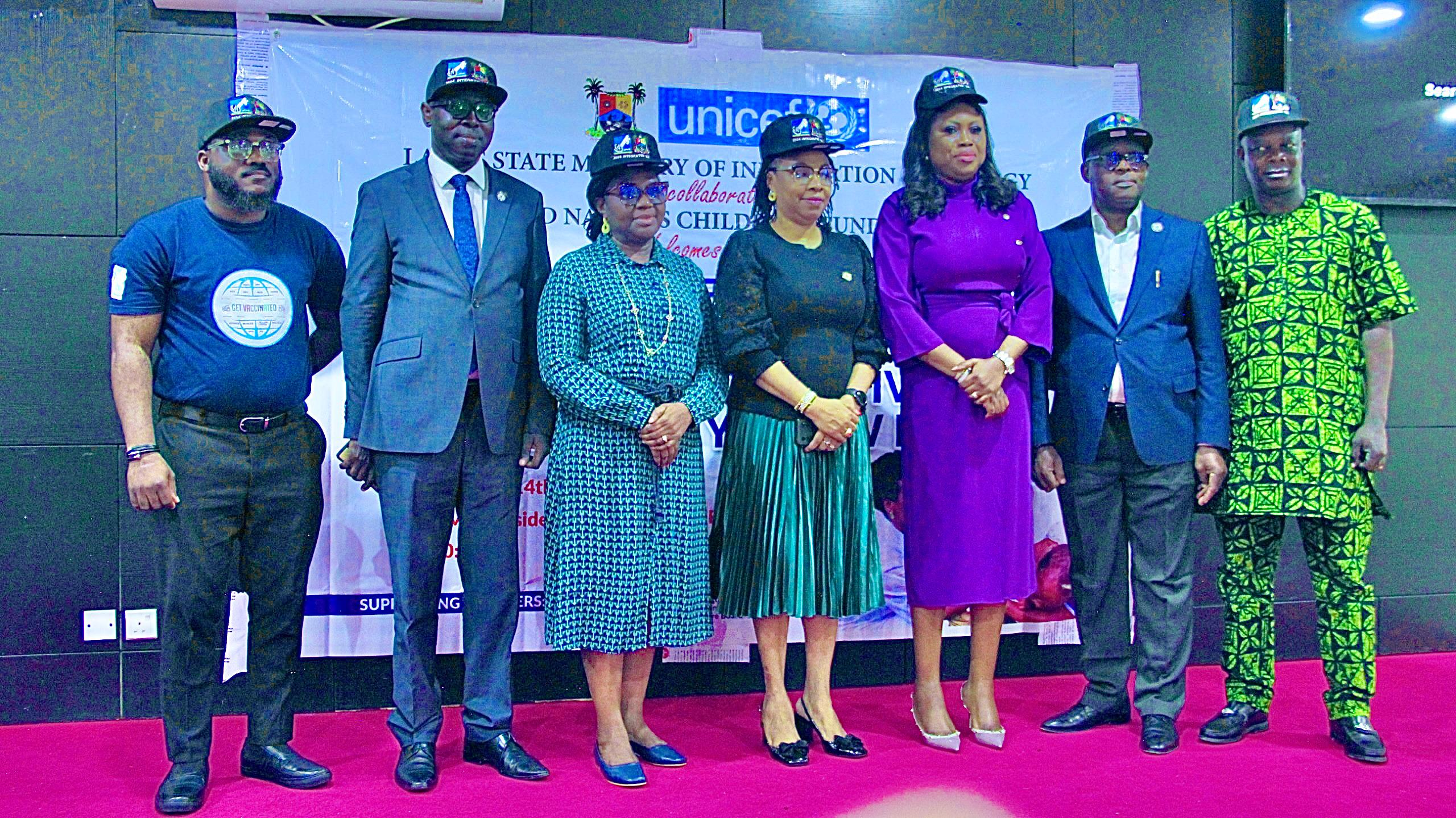
IMMUNIZING LAGOS: A SHOT IN THE RIGHT DIRECTION
By: Balogun Munirat
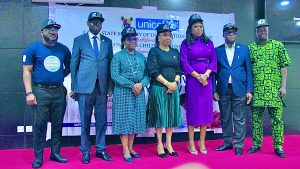
- As Lagos Govt, UNICEF Set To Vaccinate Over 18 Million Residents Against Infectious Diseases in Statewide Immunization Campaign
In a step to safeguard its citizens’ health in the bustling metropolis of Lagos, where over 21 million inhabitants vie for space and resources, the Lagos State Government has announced a major initiative to vaccinate over 95% of its residents against yellow fever and other diseases within the next two months. This statewide non-polio supplemental immunization campaign will be launched on October 18, 2024, with the actual immunization commencing on October 19, 2024.
As a result of this, the Lagos State Ministry of Information and Strategy, in collaboration with United Nations Children’s Fund (UNICEF), in a bid to strengthen immunization programs and protect its vast population, recently organized a media orientation on Non-Polio Supplement Immunization (NPSI) activities at Alausa Ikeja on Monday, October 14, 2024. The event brought together journalists, health officials, and partners to promote awareness and support for NPSI efforts.
Lagos faces unique immunization hurdles; urbanization, population growth, and limited access to healthcare in some areas make immunization a daunting task. Yet, the state has made significant strides, vaccinating over 1 million children against vaccine-preventable diseases in the past year.
In the quest for immunization excellence, Lagos State has taken a significant leap forward with the media orientation. The media plays a vital role in promoting immunization awareness. The initiative aims to sensitize media professionals on the importance of immunization, provide accurate information to combat misconceptions and myths surrounding vaccines and equip media professionals with the knowledge to effectively report on NPSI and support the government’s efforts to strengthen immunization programs. By fostering media support and promoting public awareness, Lagos State is poised to achieve its goal of 95% vaccination coverage, safeguarding the health and well-being of its citizens.
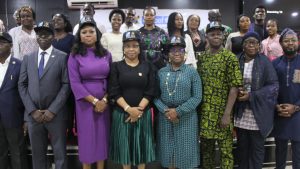
NPSI focuses on vaccinating children against diseases such as measles, yellow fever, and pneumonia. According to the World Health Organization (WHO), these diseases account for significant morbidity and mortality among children under 15.
Delivering his keynote address at the media orientation, Dr. Abimbola Bowale, Supervising Permanent Secretary of the Lagos State Primary Healthcare Board (LSPHCB), said, “Our commitment to safeguarding the health of our nation is unwavering and immunization plays a crucial role in that. Immunization is the first line of defense in strengthening the health indices of a family, the healthcare system and society as a whole.”
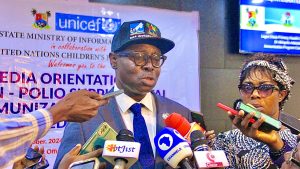
“The role you play in disseminating accurate and impactful information is pivotal in our collective effort to ensure that every child receives lifesaving immunizations with no one left behind.”
He continued by talking about the NPSI activities, saying, “Non-polio SIAs are a critical component of our strategy to protect children from vaccine-preventable diseases. The vaccines to be given include measles, yellow fever, and other routine immunizations, including HPV.
“The goal is to achieve herd immunity and the only way to do so is to ensure that at least 95% of the eligible population receives the measles vaccine and 95% of the eligible population receives the yellow fever vaccine.
“These activities are not merely operational tasks; they are life-saving interventions that contribute to the health and well-being of our future generations.”
He implored the press to harness their platforms to amplify the message by reaching out to communities with compelling and accurate narratives while also helping to drive home the importance of immunizations and dispel any myths or misconceptions.
At the media orientation on Monday, the press were informed about the ongoing NPSI awareness campaign and the upcoming vaccination campaign, which will commence on the 19th of October 2024, across Lagos State, with the goal of attaining collective immunity of over 18 million people.
On his part, Dr. Akinpelu Adetola, Immunization Program Coordinator, Lagos State Primary Health Care Board for Health, gave a presentation on the 2024 integrated Supplement Immunization Activities (SIAs), where he gave an overview on the disease prevention of yellow fever, measles and other vaccination-preventable diseases, including cervical cancer (HPV), within Lagos State. The purpose of the presentation was to describe the current disease prevention situation of yellow fever, Measles and cervical cancer in Lagos State, identify potential disease outbreaks and risk factors, discuss preventable measures and vaccine efficiency, and highlight the importance of collaborative efforts in disease control and prevention.
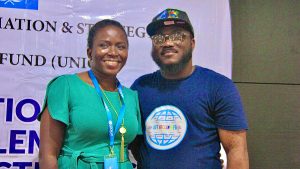
During the presentation, he stated some statistical information on transmission and outbreaks on Yellow Fever and Measles. “For yellow fever, based on cumulated data from 1st January 2024 to 30th April 2024, a total of 589 suspected cases have been reported from 288 LGAs in 36 states, including the FCT, with 6 of those cases from Lagos State.
“As for measles, a cumulated data from January to December of 2023, a total of 19,470 suspected cases were reported, with 563 of those cases from Lagos State adding that for the measles outbreaks, 8,380 (73% of confirmed cases) did not receive any dose of measles vaccine (zero dose) and another data accumulated for measles from January to July 2023, a total of 15,824 suspected cases were reported, with 8,345 (52.74%) cases were confirmed, and 69 deaths were accounted out of the confirmed cases.
Adetola went further, “For yellow fever, anyone from 9 months to 44 years of age can get the vaccination, the vaccines are safe and effective; it have been used for decades. A single dose by injection protects against the disease for a lifetime and antibodies develop 14days after injection. A booster dose can be taken during yellow fever outbreak.”
“Infants younger than 9 months and adults above 44 years should not take the vaccine, pregnant women and nursing mothers should also not take it, people with HIV/AIDS or other diseases that affect the immune system are not to take the vaccine either; and people who have had severe allergy to the vaccine or allergy to eggs, chicken proteins or gelatin shouldn’t get the vaccine.
“For measles, two doses are recommended, the first one to be given at 9 months and the second at 15-18 months; the 2 doses is 97% effective in preventing the disease, while 1 dose is 93% effective.
The Immunization Program Coordinator, while speaking on HPV and cervical cancer, said, “Lagos State introduced the single-dose HPV vaccine into its immunization to combat cervical cancer. The rollout, which started in October 2023, aims to vaccinate 1 million girls aged 9-14 years and a single dose of Gardasil HPV vaccine targeting types 16 and 18.
“Through sustained efforts and collaboration, we can effectively control these diseases and protect the health and well-being of our communities. We must prioritize disease prevention, advocate for mass vaccination, continuous surveillance and research, and progressively learn from our experiences to improve our response to these crucial public health issues.”
The Director Health Education and Health Promotion Services, Mrs. Honfor Grace Adesola, spoke on the demand generation of the upcoming vaccination campaign in Lagos State.
“To generate more demand, we’ve been able to engage some of our traditional leaders, religious leaders, CDAs, and CDCs, and we will still continue to do so. There has been social media awareness campaign at all levels.
Adesola went further by highlighting the community engagement strategy: “We’ve been engaging educational stakeholders and schools, both public and private schools. We have health education officers at the local government level who has been visiting most of the schools to sensitize and conduct assemblies just for them to be well informed so that by the the time the vaccination starts on the 19th of October we will have a good number of our students informed.
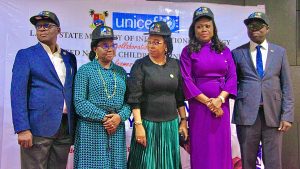
“There has also been consent forms sent out to the parents through teachers so that the children will be vaccinated. Some schools have been able to organise PTA meetings so that we could be able to sensitize the parents of their schools so that they will also be well informed.
“We also have pre-campaign strategies, where we have mobilisers training, town announcers and volunteers; all this are available to sensitize community members by doing house-to-house sensitization.
She added that during the vaccination campaign, “There will also be door-to-door visit by their town mobilizers to inform the people that the campaign has started and this is the designated areas where the immunization is taking place; they will help in directing or mobilize them to those sites.
“There will be daily social mobilisation and vaccination team. After the campaign, we will also have our strategists know the coverage through data and feedback from the communities.
“We’ve been able to have feedback of 80% awareness, which is very good but there is a need for more work to be done.
“We cannot achieve much without the media and we believe that your contribution is very important and key to the success of this campaign,” she added.
Also representing the UNICEF, Social and Behavior Change Specialist, Mrs. Aderonke Akinola Akinwole, addressed the media personnel while also clarifying the negative impact rumor, misinformation and disinformation are having on people’s perception towards vaccine.
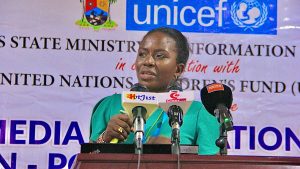
She therefore urged the media to be key players in correcting misconceptions surrounding vaccination within society.
“The media should be a model to the people—not just a voice but in action. If information which hasn’t been clarified gets to you as media personnel, let it stop with you; do not share, and if there is a need for clarification, let it be between you and a person that can clarify it.
At the media orientation, journalists engaged with health officials and partners, discussing strategies for effective reporting and promoting immunization awareness. There was a workshop activity and a group discussion among the journalists present at the orientation on other ways to create more awareness for the vaccination campaign. The atmosphere was electric, with a sense of urgency and purpose.
As Lagos continues to grow, immunization remains crucial. The media orientation marked a significant step in promoting NPSI efforts. By working together, we can protect Lagos’ future generations and create a healthier, more prosperous city.
